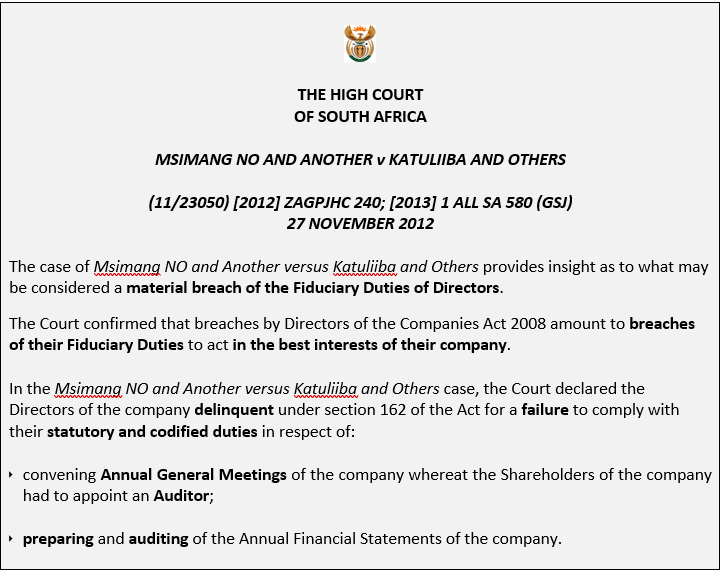 The following article is with compliments and acknowledgement from Dr Adv Leigh Hefer ofonlineMOI.co.za / GenesisCorporate.co.za
The following article is with compliments and acknowledgement from Dr Adv Leigh Hefer ofonlineMOI.co.za / GenesisCorporate.co.za
LEGISLATION
- Section 30(1) provides that each year, a company must prepare Annual Financial Statements within six years after the end of its financial year.
- Section 30(2) provides that the Annual Financial Statements of a company must be Audited if required by:
- the Companies Regulations;
- the MOI of the company;
- a Shareholders Resolution;
or Independently Reviewed if required by: - the Companies Regulations.
- Companies Regulation 28(2)(a) provides that a profit or non-profit company must have its Annual Financial Statements for that financial year audited if in the ordinary course of its primary activities, it holds assets in a fiduciary capacity for persons who are not related to the company and the aggregate value of such assets exceeds R5 million.
- Companies Regulation 28(2)(b) provides that a non-profit company must have its Annual Financial Statements for that financial year audited if it was incorporated by the State or if it was incorporated to perform a statutory function imposed by legislation or to perform a public function imposed by the State.
- Companies Regulation 28(2)(c)(i) provides that a profit or non-profit company must have its Annual Financial Statements for that financial year end audited if its Public Interest Score as calculated in terms of companies regulation 26(2) is 350 or more.
- Companies Regulation 28(2)(c)(ii) provides that a profit or non-profit company must have its Annual Financial Statements for that financial year audited if its Public Interest Score as calculated in terms of companies regulation 26(2) is between 100 and 349 and the Statements are internally compiled.
- Section 30(2A) provides that a company is exempt from the requirements to have its Annual Financial Statements audited or independently reviewed if every Shareholder is also a Director of the company called an
- owner-managed company, unless:
- the Public Interest Score is 350 or more – audit;
- the Public Interest Score is between 100 and 349 and the Statements are internally compiled – audit;
- the Public Interest Score is between 100 and 349 and the Statements are externally compiled – independently reviewed;
- the company is bound in terms of other legislation to have its Annual Financial Statements audited – audit;
- the company is bound in terms of an Agreement to which the company is a party to have its Annual Financial Statements audited – audit.
- Section 22(1) provides that a company must not carry on its business with gross negligence. Section 20(4) provides that the Shareholders, Directors or Prescribed Officers of a company may apply to a High Court for a Court Order to restrain the company from doing anything inconsistent with the Act e.g., refuse to have the company’s Annual Financial Statements audited or independently reviewed if the Statements are required to be audited or independently reviewed.
- Section 20(6) provides that each Shareholder of a company has a claim for damages against any person who intentionally, fraudulently or due to gross negligence causes the company to do anything inconsistent with the Act e.g., refuse to have the company’s Annual Financial Statements audited or independently reviewed if the Statements are required to be audited or independently reviewed.
- Section 214(1)(c) provides that a person is guilty of an offence if the person was knowingly a party to an act or omission by a company calculated to defraud a Creditor, Employee or a Shareholder of the company. Section 216(a) provides that any person convicted of an offence in terms of the Act is liable in the case of a contravention of section 214(1)(c) to a fine or imprisonment for a period up to 10 years, or to both a fine and imprisonment.
- Section 218 deals with civil actions and section 218(2) provides that a Director or a Shareholder of a company who contravenes any provision of the Act is liable to any other person for losses or damages suffered by that person as a result of the contravention.
APPLICATION
- Section 66(1) of the Act provides that the business and affairs of a company must be managed by or under the direction of the Director(s) of the company who has the authority:
- to exercise all of the powers of the company;
- to perform all the statutory functions of the company for instance to have the Annual Financial Statements of the company audited or independently reviewed as required by section 30 of the Act and the Companies Regulations.
- In the event that the Annual Financial Statements of the company is required to be audited or independently reviewed and the Director(s) have failed to comply with this statutory duty imposed on them:
- it may amount to an offence calculated to defraud a Creditor, Shareholder or an Employee of the company which is punishable by a fine or by a term of imprisonment;
- it may amount to gross negligence and Shareholders; co-Directors and Prescribed Officers may apply to Court for a Restraining Order;
- it may amount to gross negligence and Shareholders of the company and any other person may institute a civil claim for damages or losses suffered in terms of section 218(2).
- Section 161 deals with the application to protect the rights of Shareholders and provides that a Shareholder may apply to a Court for a Court Order to rectify any harm done to the Shareholder by the company as a consequence of an act or omission that contravened the Act or the company’s MOI for instance not having the Annual Financial Statements of the company audited or independently reviewed if required by the Act or the Regulations.
- Section 77(3)(b) deals with the liability of Directors and Prescribed Officers and provides that a Director of a company is liable for any loss, damages or costs sustained by the company as a consequence of the Director having acquiesced in the reckless and fraudulent carrying on of the company’s business.
- Section 77(3)(c) provides that a Director of a company is liable for loss, damages or costs sustained by the company as a consequence of the Director having been party to an act or omission by the company despite knowing that the act or omission was intended to defraud a Creditor, Shareholder or Employee of the company for instance not having the Annual Financial Statements of the company audited or independently reviewed if required by the Act or the Regulations.
- Section 162 deals with the application to declare a Director delinquent or to place the Director under probation and section 162(5)(c)(iv)(aa) provides that a Court must make an Order declaring a person to be a delinquent Director if the person acted in a manner that amounted to gross negligence, willful misconduct or breach of trust in relation to the performance of the Director’s functions within the company and in relation to the Director’s duties to the company for instance not having the Annual Financial Statements of the company audited or independently reviewed if required by the Act or the Regulations.
- Section 162(5)(c)(iv)(bb) provides that a Court must make an Order declaring a person to be a delinquent Director if the person acquiesced in the reckless and fraudulent carrying on of the company’s business or have been a party to an act or omission by the company despite knowing that the act or omission was intended to defraud a Creditor, Shareholder or Employee of the company for instance not having the Annual Financial Statements of the company audited or independently reviewed if required by the Act or the Regulations.
- Section 162(7) provides that a Court may make an Order placing a person under probation if while serving as a Director, the person acted in a manner that is materially inconsistent with the duties of a Director for instance not having the Annual Financial Statements of the company audited or independently reviewed if required by the Act or the Regulations.
CASE LAW

Please visit onlineMOI.co.za / GenesisCorporate.co.za for related articles from Dr Adv Leigh Hefer.

